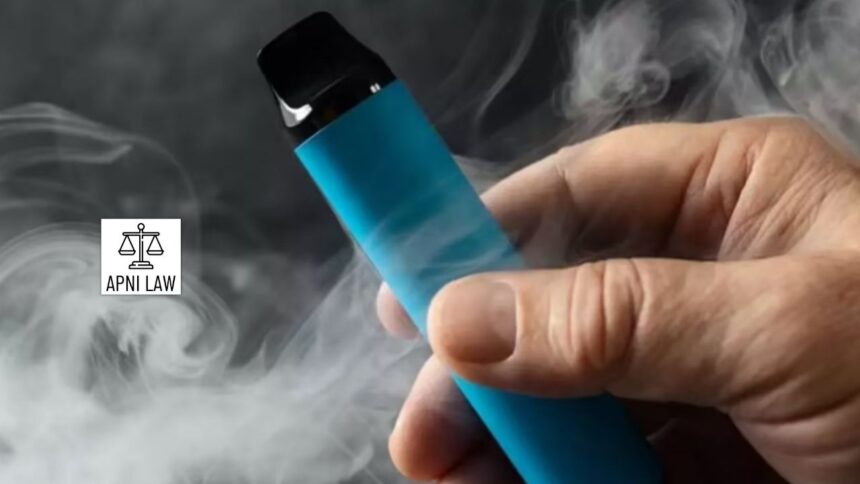Introduction
Indian law treats e-cigarettes and regular tobacco products very differently. While tobacco is regulated under the Cigarettes and Other Tobacco Products Act, 2003 (COTPA), e-cigarettes are banned under the Prohibition of Electronic Cigarettes Act, 2019 (PECA). The distinction arises from their composition, health risks, and the policy approach adopted by lawmakers.
What Is An E-cigarette
E-cigarettes are battery-operated devices that heat a liquid to produce vapor for inhalation. This liquid may or may not contain nicotine, but it does not include tobacco leaf. Regular tobacco products such as cigarettes, bidis, cigars, and chewing tobacco contain actual tobacco plant material. These products are regulated as part of India’s tobacco control framework.
What Is The Difference Between An E-cigarette and Tobacco
Regular tobacco products fall under the Cigarettes and Other Tobacco Products Act, 2003. The law allows their production, sale, and distribution but under strict conditions. Advertising is heavily restricted, and violations attract penalties. E-cigarettes, on the other hand, are covered by the Prohibition of Electronic Cigarettes Act, 2019. This law enforces a complete ban on their production, import, sale, storage, distribution, and advertisement. Even possession may be considered a violation in many cases.
Is Advertisement and Promotion Of Tobacco Prohibited
The law strictly limits the promotion of regular tobacco. Although most forms of advertisement are prohibited, sale and distribution are still allowed in certain permitted forms and areas. In contrast, the law forbids all forms of advertisement and promotion for e-cigarettes. Online and indirect marketing are also banned. Unlike tobacco, even storing e-cigarettes for personal or business use is considered illegal.
Penalties
Violations under COTPA, such as advertising or selling tobacco to minors, bring penalties depending on the offence. Under PECA, the punishments are much harsher. A first offence for dealing in e-cigarettes can lead to one year in jail, a fine of up to one lakh rupees, or both. A repeat offence can result in imprisonment for up to three years, a fine of up to five lakh rupees, or both. Storing e-cigarettes attracts up to six months in jail, a fine of fifty thousand rupees, or both.
What About Personal Possession Of E-cigarettes and Tobacco
Indian law allows individuals to buy and use tobacco products for personal consumption, even though their sale is regulated. The position for e-cigarettes is very different. All commercial activity is banned, and authorities often treat possession as proof of storage or transport. This means even travelers or individual users may face legal trouble if found with e-cigarettes.
The government regulates tobacco because its harms are well known, and the law aims to reduce damage through restrictions and public awareness. E-cigarettes are banned outright because of their appeal to youth, their uncertain long-term health effects, and the fear of creating a new addiction problem. The policy reflects a preventive approach rather than a regulatory one. For any specific query call at +91 – 8569843472
Conclusion
E-cigarettes and regular tobacco products are treated in very different ways under Indian law. Tobacco products remain legal but heavily regulated under COTPA. E-cigarettes are completely banned under PECA since 2019, with severe penalties for anyone involved in their trade, storage, or promotion. The key difference lies in policy: tobacco is controlled and monitored, while e-cigarettes are prohibited to prevent a new public health crisis.








